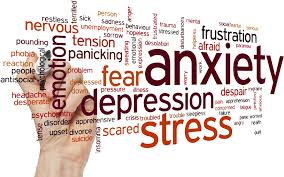What is Anxiety?
Anxiety is a natural response to stress, but when it becomes overwhelming or persistent, it can interfere with daily life. It can cause excessive worry, fear, and physical symptoms. But what causes anxiety, and how can it be managed? Let’s explore.

What Causes Anxiety?
Anxiety can be triggered by various factors. Could one of these be affecting you?
- Genetics – Does anxiety run in your family? A genetic predisposition may increase your risk.
- Brain Chemistry – Could an imbalance in neurotransmitters like serotonin or dopamine contribute?
- Stressful Life Events – Have you recently experienced trauma, loss, or major life changes?
- Medical Conditions – Could an underlying health issue (like thyroid disorders or heart disease) be making anxiety worse?
- Substance Use – Do caffeine, alcohol, or drug use trigger or worsen your symptoms?
- Personality Traits – Are you naturally more prone to worry? Some personality types are more likely to experience anxiety.
Anxiety can be complex, but recognizing the cause is the first step toward managing it.
What Are the Symptoms of Anxiety?
Anxiety affects both the mind and body. Have you noticed any of these symptoms?
- Emotional Symptoms:
- Excessive worry or fear – Do you constantly feel on edge?
- Restlessness – Do you have trouble relaxing?
- Irritability – Do small things frustrate or overwhelm you?
- Difficulty concentrating – Does your mind race with intrusive thoughts?
- Physical Symptoms:
- Rapid heartbeat – Do you feel like your heart is pounding or racing?
- Shortness of breath – Do you sometimes struggle to take deep breaths?
- Muscle tension – Are your shoulders, neck, or jaw frequently tense?
- Dizziness or nausea – Do you experience lightheadedness or an upset stomach?
- Sleep disturbances – Do you have trouble falling asleep or staying asleep?
Could anxiety symptoms be mistaken for another condition? Yes—heart conditions, thyroid disorders, and even dehydration can mimic anxiety.

Types of Anxiety Disorders
Anxiety isn’t just one condition—it comes in different forms. Could you have one of these?
- Generalized Anxiety Disorder (GAD) – Do you worry excessively about everyday situations?
- Panic Disorder – Do you have sudden panic attacks with intense fear and physical symptoms?
- Social Anxiety Disorder – Do you fear social interactions or public speaking?
- Phobias – Do specific objects or situations (like heights, flying, or spiders) trigger extreme fear?
- Obsessive-Compulsive Disorder (OCD) – Do you have repetitive thoughts or behaviors you can’t control?
- Post-Traumatic Stress Disorder (PTSD) – Have you experienced trauma that causes flashbacks or severe anxiety?
Understanding the type of anxiety you have can help determine the best treatment approach.
How is Anxiety Diagnosed?
Doctors and mental health professionals use several methods to diagnose anxiety. What should you expect?
- Medical History & Symptoms – Are your symptoms affecting your daily life?
- Psychological Evaluation – Could a questionnaire help identify anxiety triggers?
- Physical Examination – Could an underlying health issue be contributing to your symptoms?
Anxiety is highly treatable, but proper diagnosis is key to finding the right solutions.
How is Anxiety Treated?
Anxiety treatment depends on its severity. What are your options?
- Lifestyle Changes:
- Regular exercise – Could movement help reduce tension and improve mood? Yes!
- Healthy diet – Are you avoiding caffeine, sugar, and processed foods that can worsen anxiety?
- Good sleep hygiene – Are you getting 7-9 hours of restful sleep?
- Therapy:
- Cognitive Behavioral Therapy (CBT) – Could changing thought patterns help reduce anxiety?
- Exposure Therapy – Does gradually facing fears help desensitize anxiety triggers?
- Mindfulness & Relaxation Techniques – Have you tried meditation, deep breathing, or progressive muscle relaxation?
- Medications:
- Selective Serotonin Reuptake Inhibitors (SSRIs) – Can antidepressants like Prozac or Zoloft help balance brain chemistry?
- Benzodiazepines (for short-term use) – Can medications like Xanax or Ativan provide fast-acting relief?
- Beta-Blockers – Do they help control physical symptoms like rapid heartbeat?
Does everyone need medication? No—many people manage anxiety through therapy and lifestyle changes alone.

Can Anxiety Be Prevented?
While you can’t always prevent anxiety, can you reduce the risk?
- Manage stress effectively – Do you set aside time for relaxation and hobbies?
- Limit stimulants – Are you cutting back on caffeine and alcohol?
- Stay connected – Do you reach out to supportive friends or family?
- Seek help early – Have you spoken to a doctor or therapist before anxiety worsens?
Taking proactive steps can help keep anxiety under control.
When Should You See a Doctor?
When does anxiety require professional help? If it significantly interferes with daily life. Seek help if you:
- Feel overwhelmed most days.
- Avoid situations due to fear or worry.
- Experience panic attacks.
- Have trouble sleeping or functioning at work or school.
- Feel hopeless or have thoughts of self-harm.
Anxiety is treatable, and you don’t have to face it alone.


